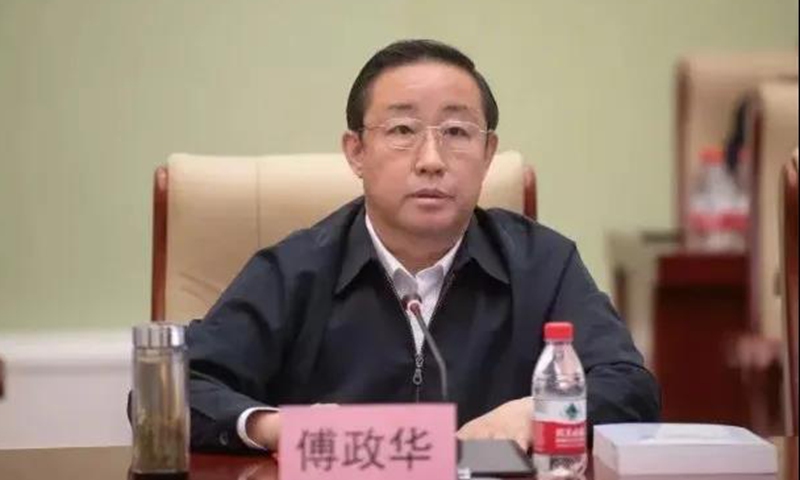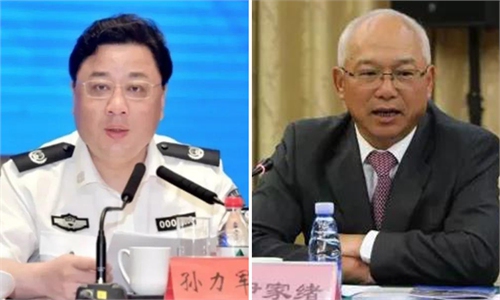China's ex-justice minister under probe for serious discipline violation amid tough crackdown on corruption in political, legal system

Fu Zhenghua
Fu Zhenghua, deputy director of the social and legal affairs committee of China's top political advisory body, is under disciplinary and supervisory investigation for suspected serious violations of Party disciplines and laws, the country's top anti-graft body announced Saturday, in the latest show of China's iron fist against corruption in the political and legal system.
Fu served as justice minister between March 2018 and April 2020 before assuming the post at the National Committee of the Chinese People's Political Consultative Conference (CPPCC).
Fu's last public appearance was his participation in an inspection tour to Southwest China's Chongqing Municipality in mid-September when the CPPCC National Committee's social and legal affairs committee carried out a special investigation on fostering judicial protection for minors' rights and interests, according to media reports.
The 66-year-old senior official was a seasoned public security officer who had taken part in the investigations of multiple major cases during his tenure at the Beijing Municipal Public Security Bureau. Months after he was appointed as the Beijing police chief in February 2010, Passion Club, or Tianshang Renjian, one of the Beijing's top nightclubs, was shut down amid a sweeping crackdown on sex trade.
Fu was later promoted to the deputy minister of public security before being named justice minister in March 2018.
Fu won't be the last one, yet he is the most representative one. Even Fu, such a high-profile individual who used to be a "star" official, was involved in corruption. This shows that the corruption problem is deeply rooted in the political and legal system, Zhuang Deshui, deputy director of the Research Center for Government Integrity-Building at Peking University, told the Global Times on Saturday.
The investigation into Fu came on the heels of a Thursday announcement that Sun Lijun, former vice minister of public security, has been expelled from the Communist Party of China (CPC) and dismissed from his post for grave discipline and law violations.
According to the announcement, in the wake of an investigation into Sun's case, the former member of the Party Committee of the Ministry of Public Security had never stayed true to the Party's ideals and faith, displayed "extremely inflated political ambition and very poor political integrity," issued groundless criticisms of the Party's policies, and spread political rumors, Xinhua reported.
Caijing cited anonymous sources reporting that when the Ministry of Public Security held a meeting on Friday discussing Sun's case, Fu's name was also mentioned.
The problems in the political and legal system have been exposed during the country's three-year national crackdown on gang crimes. If those umbrellas of the gangsters or local corrupted officials are not eradicated, the problem within this system will not be fully erased, Zhang Xixian, a professor at the Party School of the CPC Central Committee in Beijing, told the Global Times on Saturday.
Zhang opined that the language official media used to describe those officials' misdeeds is stern which also reflected how serious their violations are; and how this system used to be polluted.
Sun was among five ex-senior political and legal officials enumerated by Chen Yixin, secretary-general with the Commission for Political and Legal Affairs of the CPC Central Committee, in a bylined article in May as typical "two-faced persons" who had seriously violated political disciplines and rules.
Meng Hongwei, former vice minister of public security, was sentenced to 13 and a half years in prison for bribery in January 2020. The other three double-faced violators are Wang Like, former secretary of politics and law committee of the CPC Jiangsu Provincial Committee, former Shanghai Police Chief Gong Daoan, and Deng Huilin, former deputy mayor of Southwest China's Chongqing Municipality and former police chief of Chongqing.
In another high-profile case, Peng Bo, former deputy head of the office for the central leading group for the prevention and handling of cult-related activities, was announced in August to have been expelled from the Party for discipline breaches and face prosecution for grave offenses.
Peng, previously serving as the deputy head of the Cyberspace Administration of China, was found to have abandoned his principles and beliefs and became disloyal to the Party.
What is shocking of all is that those officials were still committing rampant violations even after the 18th National Congress of the CPC, when leaders repeatedly stressed the Party's staunch determination of eradicating corruption, and several high-level officials were busted for corruption, Zhang remarked.
"Now we are at the new beginning of the next one hundred years of the CPC, we need to ensure the integrity of our political and legal system, so to guarantee the principle of rule by the law," he continued, noting that the anti-corruption campaign will never be stopped.
In the words of Zhuang, a well-functioning political and legal system is the guarantee of a country's justice, so the central government is very serious about cracking down on corruption and problems in the system. The anti-graft drive targeting grassroot-level political and legal system has already achieved systematic results, now those corrupted middle- and high-level officials are spared and will sooner or later be brought to justice.
Over the course of a three-year national crackdown campaign on gang crimes, the country's discipline inspection and supervisory authorities have handled 89,700 gang-related corruption and "protection umbrella" issues and filed cases against 115,900 people, including 46,500 judicial and public security officers, accounting for 40 percent of the country's total of those who have been investigated and punished in the system, official data showed.

